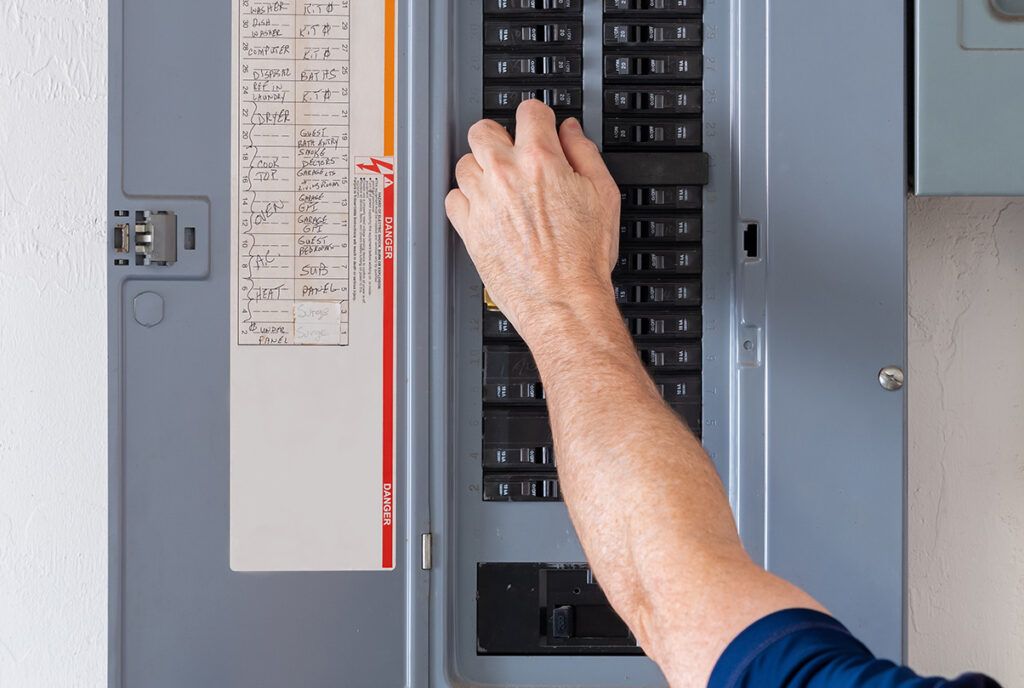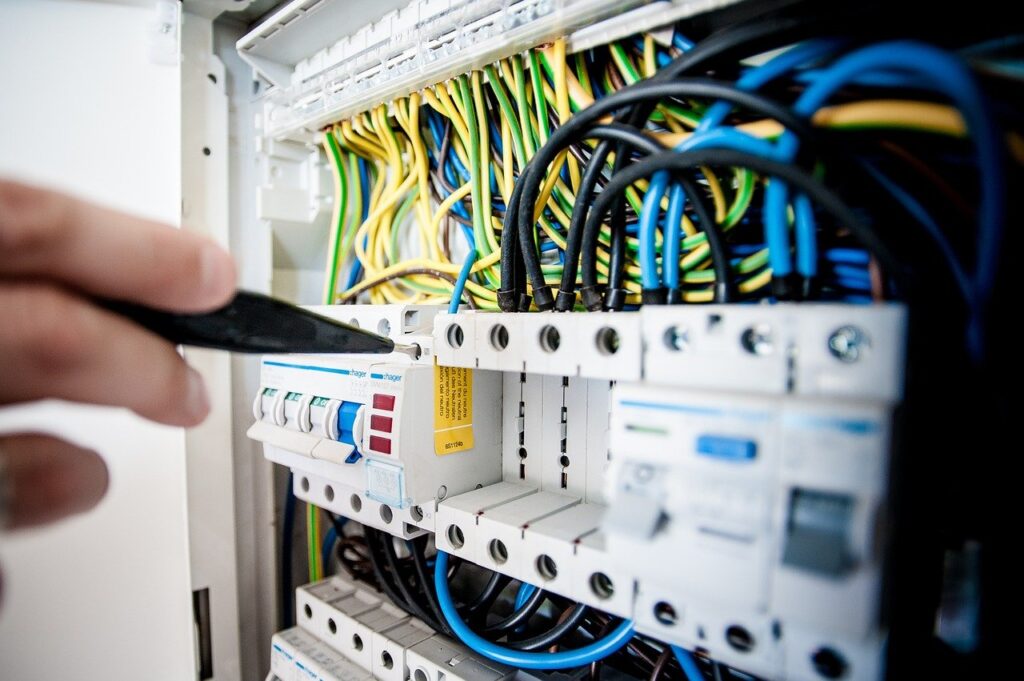Neat Tips About How Do I Know If My Circuit Breaker Needs To Be Replaced

How To Use Circuit Breaker
Is Your Circuit Breaker About to Give Up the Ghost? A Homeowner's Guide
Okay, let's be honest. Staring at that circuit breaker panel isn't exactly anyone's idea of a fun Saturday afternoon. But sometimes, that dull grey box holds the key to keeping your lights on and your Netflix binge sessions uninterrupted. The burning question we're tackling today: how do you know if your circuit breaker needs to be replaced? The keyword here is "circuit breaker needs to be replaced" where the keyword is a noun phrase. Think of this as detective work, minus the trench coat and magnifying glass (unless you're into that sort of thing, no judgement!).
1. Spotting the Warning Signs
Circuit breakers aren't meant to last forever. They're like the unsung heroes of your electrical system, constantly working to prevent overloads and keep your home safe. Over time, however, they can wear out, malfunction, or simply become outdated. Ignoring the warning signs can lead to serious problems, including electrical fires. So, let's dive into the signs that suggest it might be time for a replacement.
One of the most common clues is frequent tripping. Now, an occasional trip is normal — maybe you plugged in too many appliances at once. But if a particular circuit trips constantly, even when you haven't changed your power usage, that's a red flag. It could mean the breaker is faulty, or there's a deeper problem in the circuit itself. Think of it like a car alarm that goes off for no reason; eventually, you stop trusting it.
Another telltale sign is physical damage. Take a close look at the breaker itself. Are there any cracks, burns, or melted spots? Does it smell like something burned? These are all indicators of serious damage. Don't even think about touching it; call a qualified electrician immediately. Safety first, always!
Age can also be a factor. Most circuit breakers are designed to last 25 to 40 years. If your panel is older than that, it might be time to consider an upgrade, even if you're not experiencing any obvious problems. Technology has improved over the years, and newer breakers offer better protection. It's like upgrading from a flip phone to a smartphone; the basic function is the same, but the features and performance are vastly superior.

18 Signs That Your Circuit Breaker Needs Replacement HomeAlliance
Decoding the Circuit Breaker
2. Sticking Around is a Bad Sign
A circuit breaker is designed to trip (turn off) when it detects an overload or short circuit. But what if it won't trip? This can be just as dangerous as one that trips too often. A breaker that sticks in the "on" position during an overload won't protect your wiring from overheating, which can lead to a fire. It's like a faulty seatbelt in a car crash; it's supposed to protect you, but it fails at the crucial moment.
On the flip side, sometimes a circuit breaker refuses to stay on. You flip it to the "on" position, and it immediately trips back off. This could indicate a serious problem with the circuit, such as a short circuit. Continuing to force the breaker to stay on is not recommended; get it checked out by a professional. Think of it as trying to start a car with a dead battery; you might get it to turn over a few times, but eventually, you'll just drain the battery completely.
Another thing to listen for are buzzing or humming sounds coming from the breaker panel. While not all buzzing sounds are cause for alarm, a persistent or unusually loud buzzing could indicate loose connections or arcing, which is a dangerous electrical discharge. It's like the sound of a swarm of bees in your walls; it's not a good sign!
And let's not forget the importance of testing your circuit breakers periodically. Many breakers have a test button that you can push to simulate a fault condition. If the breaker trips when you push the test button, that's a good sign. If it doesn't, it's time to call an electrician. Think of it as a regular check-up for your car; it helps identify potential problems before they become major headaches.

The Sniff Test
3. Burning smells? Get out!
Okay, so this might seem obvious, but if you smell something burning near your circuit breaker panel, don't hesitate. Turn off the main breaker (if you can safely do so) and call an electrician immediately. A burning smell is a clear indication of overheating or electrical arcing, which can quickly lead to a fire. It's like smelling smoke in your house; you don't stick around to investigate; you get out!
Sometimes the smell might not be a strong, burning odor, but more of a faint, acrid smell. This could still indicate a problem, especially if it's accompanied by other warning signs, such as frequent tripping or buzzing sounds. Trust your senses; if something smells off, it probably is. Consider it like an unusual odour coming from food in the fridge; it's usually a sign something isn't right.
But how do you know if the smell is actually coming from the circuit breaker panel? One way to check is to carefully sniff around the panel, paying attention to any specific areas where the smell seems strongest. Be careful not to touch anything inside the panel. You can also try turning off individual circuits to see if the smell disappears, which could help you isolate the problem.
Remember, electricity and water don't mix. If you suspect water damage to your circuit breaker panel, don't touch anything. Turn off the main breaker (if safe) and call an electrician immediately. Water can create a dangerous electrical hazard. This is more serious than a leaky faucet; its a life threatening situation if not handled correctly.

DIY or Call a Pro? Knowing When to Back Away Slowly
4. Safety First!
Replacing a circuit breaker might seem like a simple DIY project, but it's important to be realistic about your skills and knowledge. Working with electricity can be dangerous, and even a small mistake can have serious consequences. If you're not comfortable working with electricity, or if you're unsure about any step of the process, it's always best to call a qualified electrician.
There are some situations where DIY is definitely not an option. For example, if you're dealing with a damaged circuit breaker panel, or if you suspect water damage, it's crucial to call a professional. Also, if you're not familiar with electrical codes and regulations in your area, it's best to leave the work to someone who is.
However, if you're confident in your abilities and you're familiar with electrical safety procedures, you might be able to replace a single circuit breaker yourself. But even then, it's important to take precautions. Turn off the main breaker before you start working, and use insulated tools. Also, double-check that the new breaker is the correct type and amperage for the circuit.
Ultimately, the decision of whether to DIY or call a pro depends on your individual circumstances. But when it comes to electricity, it's always better to err on the side of caution. It's like trying to fix your own car engine; if you're not a mechanic, you could end up doing more harm than good.

Frequently Asked Questions (FAQs) About Circuit Breakers
5. Q
A: It's a good idea to test your circuit breakers at least once a year. This helps ensure that they're functioning properly and can protect your home from electrical overloads. Think of it as an annual health check-up for your electrical system.
6. Q
A: Frequent tripping could indicate a problem with the circuit, such as an overload or a short circuit. It could also mean that the circuit breaker is faulty and needs to be replaced. It is not normal so investigate what the cause could be or consult a professional to find out if "circuit breaker needs to be replaced."
7. Q
A: No, you should never replace a circuit breaker with a higher amperage breaker. This can overload the wiring and create a fire hazard. Always use a breaker with the correct amperage for the circuit.
8. Q
A: Always wear safety glasses and insulated gloves when inspecting a circuit breaker. If possible, use a non-contact voltage tester to ensure that there is no electricity flowing through the breaker before touching it.
